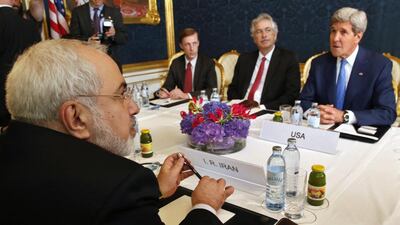Iran was not invited to the international conference held in Paris this week to discuss ISIL. The supreme leader, Ayatollah Ali Khamenei, declared that it had rejected an offer to cooperate, while the Americans said that they too did not want to collaborate with Iran.
Yet in recent weeks American and Iranian officials have met in Iraq to discuss the ISIL danger, with the approval of their governments. American aircraft played a key role in the Iraqi army’s and Shia militias’ recent breakthrough to Amerli. A video from the town showed a celebrating Qassem Soleimani, the head of the Quds Force in Iran’s Revolutionary Guard, a scene that must have embarrassed the Obama administration.
Whatever their shared interests in defeating ISIL, both Washington and Tehran are very keen not to appear to be coordinating. The Americans don’t want to be seen as waging a war against Sunnis on behalf of Iran, which it accuses of terrorism. The Iranians don’t want to be portrayed as subordinate to the US in a fight in its own back yard.
These manoeuvres aside, the bigger picture suggests that the campaign against ISIL hides another reality: Iranian expansionism in the Middle East appears to have hit serious obstacles with the reversals in Iraq, the mounting pressures against Bashar Al Assad’s regime in Syria, the fact that Hizbollah is now stuck in the Syrian quagmire, and the regional consensus recently against Hamas in Gaza.
That is why both the Arab states and Iran are of two minds when it comes to the coalition against ISIL. For the mainly Sunni Arab states, defeating ISIL is desirable, but far less so if it helps Iran once again to extend its political reach in the region. For the Iranians, ISIL is a mortal enemy, but if overcoming the group weakens Iran’s hand in Iraq and Syria, then Tehran will never agree to support the coalition’s actions.
Iranian anxieties may be well founded. After the fall of Mosul, the United States’s return to Iraq was both quick and effective. Where Iranian officials were telling their Iraqi Shia allies that it was necessary to rely on Shia solidarity to repel the ISIL offensive, the Americans quickly sent military forces and stopped the group in its tracks when Erbil seemed in peril.
Iran retains considerable power in Baghdad, but it could not have welcomed the American return. Iranian officials, including Ayatollah Khamenei, sought prime minister Nouri Al Maliki’s departure when Iraqi Shia figures, above all Ayatollah Ali Sistani, called on him to step down, but Tehran did not relish being pushed into a confrontation with Mr Al Maliki.
The combination of broad Iraqi displeasure with the prime minister and American support for a replacement proved decisive in forcing Iran to respond. When Iraqi militias close to Iran endorsed a new prime minister, Mr Al Maliki knew the game was up. Iran, usually the initiator of action in Iraq, was compelled to react to a situation it hadn’t directed.
In Syria, the Iranians also sense the risks. President Barack Obama’s policy there remains uncertain as he hopes to rely on so-called moderate rebel forces to overcome ISIL. Iran realises the difficulties, which may strengthen Mr Al Assad, but it also knows that once American warplanes are over Syria, this may create new dynamics that will undermine the Syrian regime.
For instance, Mr Obama has warned that if the Al Assad military fires at American aircraft, because the coalition has refused to coordinate with Syria’s government, its positions would be attacked. This could weaken Mr Al Assad.
Nor has Syria’s war been going Iran’s way. Mr Al Assad is holding out, but he is not winning. Rebel forces around Damascus and in the south of the country have gained ground lately, while thousands of rebels and jihadists are still present in Qalamoun, along the border with Lebanon, where they have tied down thousands of Hizbollah and regime combatants.
Iran’s regional assets are everywhere facing pushback. Hamas made significant symbolic gains in Gaza, but what the recent fighting showed was that some Arab countries quietly supported Israel’s bombing campaign. The Houthis have advanced in Sanaa, demanding a greater say in power, but amid fighting with the army and armed tribesmen, it’s not evident that they will be able to build something durable.
In Lebanon, Hizbollah remains strong. However, the combination of an indecisive, costly war in Syria and the party’s inability to prevent rising Sunni hostility means there are real limitations on Hizbollah’s power. A sectarian civil war in the country could neutralise the party’s fighting capability in Syria, and Hizbollah has been very careful to avoid one.
Iran’s problem is that it gains from fragmentation in the Arab world. Its policies in Syria and Iraq have always been about dividing those countries into digestible fragments, to facilitate Iranian hegemony, rather than pushing for unity.
Yet in Iraq that policy, which Mr Al Maliki implemented with Iranian backing, alienated the Sunni community and led to the calamities of today. In Syria, it has brought de facto partition, while Mr Al Assad’s ability to reassert his authority even in the areas he considers vital is rapidly diminishing.
Mr Obama does not view his war against ISIL as a war against Iran. But the Iranians and their Arab rivals may regard things differently. The deadly stalemate in the region is breaking, and who ultimately gains from this is anybody’s guess.
Michael Young is opinion editor of The Daily Star newspaper in Beirut
On Twitter @BeirutCalling


